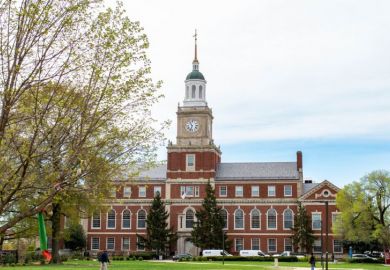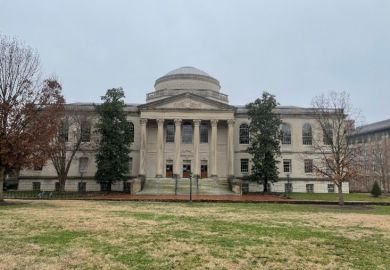A year at the centre of racial controversy in US higher education appears to have done little to dampen student enthusiasm for the University of North Carolina at Chapel Hill, with its great academic value apparently overriding deeply felt equity concerns.
As one of the nation’s top public institutions, UNC took a huge reputational hit in the past year for its treatment of civil rights journalist Nikole Hannah-Jones, just a few years after its removal under protest of a statue honouring the Confederacy.
Several prominent black faculty have followed the lead of Ms Hannah-Jones in abandoning UNC. The state’s flagship university, however, appears to have drawn a record number of applicants for the autumn semester, even after its student body president recommended that fellow black students stay away.
Lamar Richards, in an interview just before his year-long term as student body president expired this month, described feeling tension between his love for UNC as an institution and a community and his frustration with outside political pressures and the struggles of UNC leaders to stand up to them.
The Hannah-Jones case involved the creator of the 1619 Project – which describes the central role of slavery in the founding of the US – taking a job offer at Howard University after UNC’s trustees stalled for months on affirming her tenured appointment at Chapel Hill. In response, Mr Richards, a junior public policy major from South Carolina, advised black students not to follow him to UNC.
“In the context of what was happening at that time, and continued to happen during my time here,” Mr Richards explained in a recent interview with THE, “I would not invite my younger brother or my cousin or someone that was younger than me to come here, just because it is really taxing for black students to be here.”
Yet Mr Richards talked in pained terms about that advice. He described taking criticism for staying at UNC while urging others not to come, and acknowledged that UNC is hardly alone in higher education or in wider US society in confronting serious racial challenges.
Arriving for the interview after another long road trip soliciting donations to help low-income students attend UNC, he admitted that the net benefit of UNC remains for many black students. “I have always said this: The one thing that makes it honestly worth everything that a black student might go through here is your peers – and the access to enriching academic opportunities,” Mr Richards said.
For its incoming freshmen class, UNC at Chapel Hill said it received more than 57,000 applications, marking the 18th time in the past 21 years that it has set a new record. The university said it was not willing to give a racial breakdown of that number, although Mr Richards said he expects to see a strong diversity of applicants.
Mr Richards said, however, that he recently attended a presentation at a Board of Trustees meeting about an unusually large and sudden departure of black faculty in recent months. In normal times, he said, “you might see some faculty who give you a bit more of a time frame to find a replacement or assist in that process”. Now, however, there’s black faculty “who just kind of left and said: ‘I'm not really interested in continuing to serve at the university.’”
That seems to reflect a sense that Ms Hannah-Jones’s experience is part of a wider problem for black faculty, Mr Richards said: “I always remind people that for just one celebrity there’s a dozen other people who’ve been treated the same way, whose names we will never know.”
The situation means that university leaders in North Carolina and other heavily affected states, such as Florida, must be more aggressive in blocking outside political interference – even if it means losing their jobs, Mr Richards said.
Instead, he said, leaders such as Kevin Guskiewicz, the chancellor at UNC-Chapel Hill, too often try to find compromises and middle ground. “I've told him, verbatim, that you cannot toe the middle line with this,” Mr Richards said.
An example, he said, is Dr Guskiewicz’s predecessor as chancellor, Carol Folt.
Dr Folt “toed the line – she tried to – and students hated her for it, to be quite honest,” Mr Richards said. “In the end, somewhere along the line, she realised she could not.”
Dr Folt resigned in January 2019, while simultaneously ordering the permanent removal of Silent Sam, the bronze statue of a Confederate soldier that had stood since 1913 on a central juncture of the UNC campus.
“People thought it was the end of her career,” he said of Dr Folt. “And she actually ended up becoming the president of the University of Southern California.”
Register to continue
Why register?
- Registration is free and only takes a moment
- Once registered, you can read 3 articles a month
- Sign up for our newsletter
Subscribe
Or subscribe for unlimited access to:
- Unlimited access to news, views, insights & reviews
- Digital editions
- Digital access to THE’s university and college rankings analysis
Already registered or a current subscriber?







